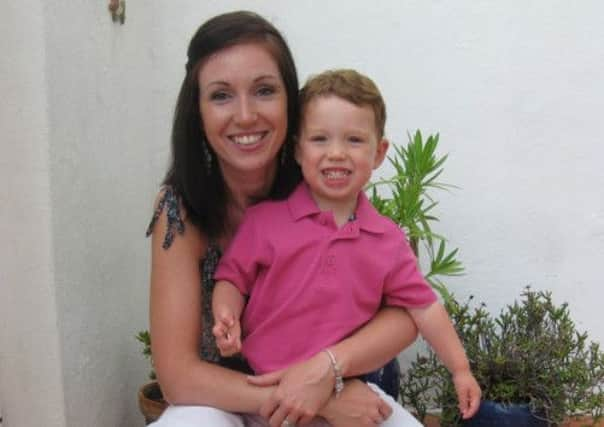Mother courage at moment of need


Berni Cooper, from Wakefield, was looking after her 14-month-old baby James when she had a stroke in 2011. She was just 30 years old.
“I was getting ready to visit my mum in Birmingham and then I just fell like a stone, everything went black.” She collapsed on the floor, next to a crying James and for a while lost the use of her left side. It has been an emotional journey for Berni to get over the overwhelming exhaustion to start her recovery process, but she was motivated by her son James and husband Chris.
Advertisement
Hide AdAdvertisement
Hide Ad“Through determination and support from family, friends and the Stroke Association, I feel like I have my life back. I am so much more appreciative of everything and feel happy waking up every morning and being able to get out of bed, enjoy my life and be a mum to James.”
Berni was one of the lucky ones, according to a Stroke Association report out today.
Too many stroke survivors and their families, from across Yorkshire and Humber, say they feel abandoned when they leave hospital and are left without the support they need to help them cope with the emotional impact of a stroke.
The charity’s report, Feeling Overwhelmed, is based on the findings of a survey of 213 people from across the region. While hospital care is rated highly, the emotional strain on survivors and their families when they return home is underestimated and often overlooked.
Advertisement
Hide AdAdvertisement
Hide AdBerni was a 30-year-old police officer at the time of her stroke. She was fit and healthy and a keen runner.
“In my head I was thinking I want to get up off the floor but it seemed a struggle. Then I saw my left arm which looked totally limp, crumpled and as if it wasn’t part of me. I wasn’t in any pain.
“I felt sick as it slumped back to the floor when I let go of it. It is a feeling I will never forget. I was terrified.
“Immediately I thought it must be a stroke due to it being my left side only and having seen the FAST adverts. With my son crying next to me on the floor my survival instinct kicked in. At that moment all I could think about was my desire to be there to see him grow up, to be able to cuddle him with both arms and walk him to school. Through some miracle I had a mobile phone in the bedroom and some how I found the strength to push myself with my right leg and arm to be able to reach it and I called the ambulance, my husband and mother in law to come and look after James.”
Advertisement
Hide AdAdvertisement
Hide AdBerni was rushed to hospital and was initially paralysed on her left side. After a number of tests, she was released after eight days as she regained some use of her left arm and leg. “It was very different when I got home. Small steps were a real problem and I kept stumbling, I couldn’t bend or pick up Jack which was hard but I knew that I shouldn’t rush it as I didn’t want another stroke.”
Berni had a slight hole in her heart which doctors believe caused her stroke and she underwent keyhole surgery to fix it.
It took her a year to get over the overwhelming exhaustion to start her recovery process but she was motivated by her son and her husband to get her life back to normal as much as possible as she didn’t want her family to end up being her carers. Berni has now made a full recovery through her determination and the support she has had from family, friends and the Stroke Association.
Ann Cooper, from the Stroke Association’s stroke support service, funded by Wakefield Council, supported Berni after her stroke. “Berni’s stroke was unexpected and devastating to her and all her family, as she was fit and active when it occurred,” says Ann. “I was able to visit Berni at home after she left hospital and helped her come to terms with what had happened. I gave her information and advice about the physical and psychological effects of stroke.”
Advertisement
Hide AdAdvertisement
Hide AdBerni added: “Just to have someone on the end of the phone was a great help. At the beginning I did have days where I just couldn’t stop crying.” In October Berni completed the Birmingham Half Marathon for the Stroke Association. It was a massive achievement, as she feared she would never be able to walk again. She now faces an even bigger challenge, as she is expecting her second baby in two months time.
FEAR AND ANGER AFTER HOSPITAL
The Stroke Association report findings reveal that in Yorkshire and Humber:
Over half of stroke survivors (60 per cent) felt depressed and nearly two thirds (65 per cent) experienced anxiety as a direct result of their stroke.
They also reported high levels of fear of a recurrent stroke (59 per cent) and anger (56 per cent).
Advertisement
Hide AdAdvertisement
Hide AdJust under half of stroke survivors (48 per cent) said they felt abandoned after leaving hospital and over half (53 per cent) had received no information or practical advice to help them cope with the emotional impact of stroke.
Stroke can also have a negative impact on relationships.
Natalie McKay of the Stroke Association explains the importance of ongoing support for stroke survivors in Opinion and Analysis in today’s Yorkshire Post. See page 13 of the main paper.